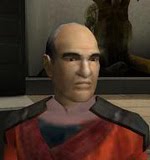The Hawaiian Islands were settled by Polynesians as early as 300 BCE. The society was structured into local chiefdoms.
In 1778, Captain James Cook "discovered" the Hawaiian islands. He was killed on his second visit to the islands after abducting a Hawaiian chief. Not such a good idea. But with these newly discovered heathens brought to the attention of the western world, missionaries came to the islands starting around 1820, and many Hawaiians converted to Christianity. But the missionaries also established schools, introduced western medicine, and developed a written form for the Hawaiian language. Unfortunately, as happened throughout the Americas, diseases came along with the westerners, killing much of the native population over the course of the 1800s.
In 1810, King Kamehameha the Great united all the Hawaiian islands under his rule. History is told by the victors, so he's generally seen as a hero for uniting the kingdom, but one must remember that he did this by killing lots of other chieftains.
Throughout the 19th Century, American and European businessmen gained increasing power in the islands. In 1887, they forced King Kalakaua to sign a constitution stripping him of most of his power. Kalakaua's sister Lili'uokalani became queen in 1891 and planned a new constitution, but the businessmen called for the U.S. to overthrow the queen and annex Hawai'i. A company of U.S. Marines invaded, and Queen Lili'uokalani surrendered under protest.
 Queen Lili'uokalani
Queen Lili'uokalaniThere was some debate at the time over whether this overthrow was legal or not, but it wasn't until 1993 that the U.S. issued a formal apology. Hawai'i existed as the Independent Republic of Hawaii until 1898 when congress voted to annex it into the U.S. International law requires a treaty of cession or a conquest for annexation, so the fact that Hawai'i was annexed by a simple vote in congress shows further questionable practices by the U.S. in regards to Hawai'i. Hawai'i became a United States Territory in 1900.
Hawai'i was the site of a significant world event when on December 7, 1941 the Japanese launched a surprise attack on the U.S.'s military base at Pearl Harbor on O'ahu. It was this attack that brought the U.S. into WWII.
Hawai'i gained statehood in 1959.
Tomorrow I'll explain what you need to know about the language, so you'll know how to pronounce all these Hawaiian names.
















3 comments:
I had no idea it was such a young (er, from our POV) country! And also sad that 2000 years of Polynesians were wiped out in just a few years... doh.
Does that mean they would've been incredibly far-removed from the rest of Eastern culture? Would they still have been practicing 'ancient' rites until the 1800s when they died of diseases?
Or did they keep up good communication/trade with the rest of the world during their early period?
Woo! Go Queen Lili'uokalani!
I like this. Brief but informative! I feel like Hawaii should still be an independent country, though. Much cooler. Who wants to be a State?
I suppose I was vague by using the term "much", but I don't think all or even most of the 2000 years of Polynesians were wiped out by disease (I don't know the numbers, though). Just a lot, as happened everywhere in the Americas. And yes, I think they were pretty far removed from the rest of Eastern culture, except for what they shared with other Polynesians when they first came over. I mean, these islands are really far from everything, so there wasn't much sailing back and forth once the people started living in Hawaii. I don't know much about what "ancient rites" you mean or whether they were practiced.
When the people of Hawaii voted on whether or not to become a state, the vote was 17 to 1 in favor. However, the other choice was to remain a territory, not to gain independence. The state has been Americanized long enough that I think most people here would want it to remain a state, but there certainly are still some people who think its independence should be restored.
Post a Comment